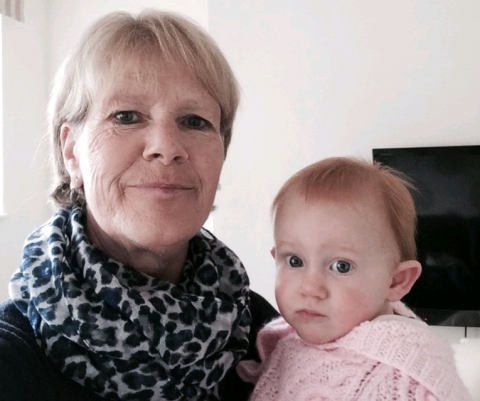In 2008, Nicky was diagnosed with cancer. Three years later, after chemotherapy treatment, she developed Myelodysplasia Syndrome (MDS) and was told that she’d need a stem cell or bone marrow transplant.
Every stem cell transplant is deeply personal, and for Nicky it threw up all kinds of questions and a wide range of emotions.
For today’s blog, Billie from the Patient Experience team visited Nicky and asked her about her transplant experiences.
Nicky with her medals from the World Transplant Games
Tell me about when you started to feel unwell again.
Towards the end of 2011 I was playing tennis, and found that I was feeling very tired and breathless – which was unusual for me as I played regularly. That set off a bit of an alarm bell, which made me visit my doctor.
My blood tests revealed a haemoglobin level of 7 (which isn’t good!), and my doctor told me that I had to come in have a blood transfusion.
At which point…I lost, it in all honesty. It may sound silly, but I really struggled with the idea of a blood transfusion, someone else’s blood in me. It made me feel somehow as if I’d be less myself if I had it – because I am me.
I went in for further tests, and had to wait some more – it’s the waiting that gets your mind racing.
I had a bone marrow biopsy, which was traumatic; not only the shock and pain of it but the implication of what it might be does cause you to unravel a bit.
I can remember going out with my husband to talk about things. We actually got quite drunk, as I remember! I told him, ‘If the tests come back really negatively, that’s it: we’ll have to get rid of the dog, we’ll have to do this, we’ll have to talk to the boys…’ and so on – I’d gone into planning mode already.
The results were back after a week. I didn’t actually get to see my doctor at the appointment; I saw a Registrar at the hospital. She took me and my husband into a room and said, ‘you’ve got something called MDS.’
She held out a chart that had a kind of timeline on it, pointed to a place on it, and said, ‘You’ve got Stage 1, and that means you have an estimated 18 months to live.’
I can’t begin to imagine how that felt to hear. What did you say?
I lost it! I was very badly behaved, my husband tells me. I felt totally consumed by anger, and so upset that I didn’t hear her say that a bone marrow transplant was a potential option to save my life. As far as I was concerned, I left that consultancy room with an 18-month death sentence.
A week later, I had an appointment with a consultant, who gave me some more information. He told me that it was actually more like three years left to live – but I’d already lived for that week so distraught, not knowing how I could leave the boys, or what I was going to do.
I was 58 at the time, and I did wonder whether they’d even entertain giving me a bone marrow transplant at my age; whether it would be considered worth it. I think my fitness levels played a part in being considered for a transplant. I’ve always played tennis, and so I was reasonably fit and (apart from the two cancers) in good health!
My whole approach to my MDS was completely different to when I had my first cancer. With that, I shut it out and I was very secretive about it, even with those close to me. When it came to the MDS I was very straight with my boys; I laid it on the line.
My consultant said I had to be ‘part of the team’, as we all had to work together and I soon saw what he meant by that; it is a team effort.
I remember my first tennis match after my first cancer. I was wearing a hoodie and feeling quite warm, so I took it off. And of course, I was wearing a wig, which came clean off! My opponents looked very surprised – they had no idea I’d had cancer. I simply kept it to myself.
Even in a very close family – which I am lucky enough to have – it is unimaginably hard to talk about serious illness. When you tell somebody how you’re feeling, be it a family member or a close friend, you cannot take it back; even in a very specific moment.
So if you say, ‘I don’t know whether this bone marrow is a reasonable thing to do. Should I just have three years of a reasonably quality of life and not go through the risks?’ they judge you, and the entire situation, by what you’ve said.
‘Was that something you thought about?’
Oh, yeah. I really considered not going through with it for a time.
I’d always felt that if the cancer came back, that would be it. I was very fatalistic with the bone marrow transplant too, at first. I thought to myself, ‘I’ve had a cracking life; I haven’t really had any major traumas or upsets. Perhaps this it for me.’
Further testing at the hospital found that a bone marrow transplant transplant was the only option, and it was a decision I thought long and hard about.
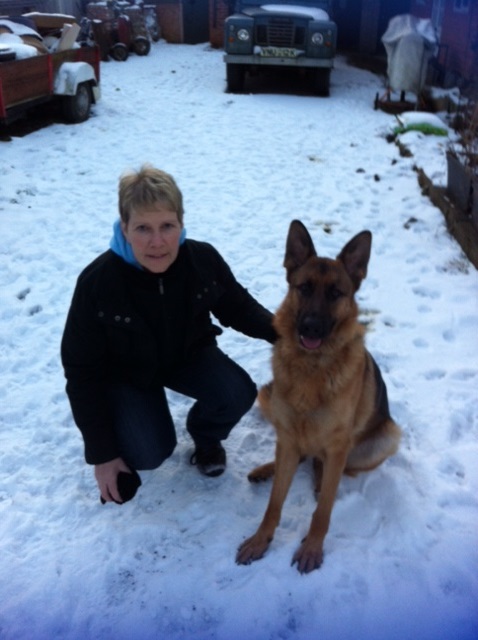
Nicky with her dog 2012
So then you met with the transplant team at The Churchill Hospital.
Yes; my first consultant at Oxford was inspirational. He really was. At the time, I felt like I was the only person he was treating. He got to know me so well, and took his time with the family, too.
My second consultant was also brilliant, but the total opposite. He told me everything very straight; he told me I had a 40% chance of it working and a 25% chance of dying from an infection.
Was that direct approach hard, or did you want to hear it?
I needed to understand the risks as they truly were, so I could weigh it up. Despite the chances of a negative outcome being relatively high, the odds weren’t exactly in my favour as it stood! So I felt like I had to give it a go – it felt defeatist not to.
Having said that, I felt that I wouldn’t come out of hospital. In my own mind, I’d described it as ‘planning to die’. So I was putting my house in order: writing my will, priming the boys, making sure my husband could cope with things, and even spending my Tesco Club Card points!
And do you know – I began to get this overwhelming sense of contentment. It was almost a privilege to have this opportunity to sort things out, to the point where I organised all my little ornaments and bits of jewellery, and I sat down with my boys and got them to understand the history of those things.
So they could pass those family items on to others?
So they could feel a little bit guilty when they gave it all away to the Oxfam shop!
When were you told your transplant date?
I asked to be treated after Wimbledon, as tennis is my big love. I wanted to enjoy my last Wimbledon.
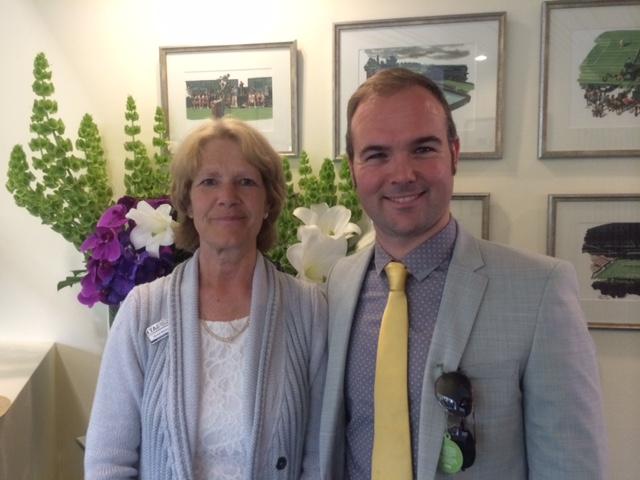
At Wimbledon with family
Were your siblings tested to see if they were a match for you?
Yes; I have two sisters and a brother. None of them were a match for me – although two of them matched each other, should they ever need it!
So my donor was unrelated; one of the kind people who sign up to the register.
I was told there were 16 possible matches for me, but they’d decided on a woman, and shortly afterwards I was given the news that they’d had their medical and were all clear and willing to donate.
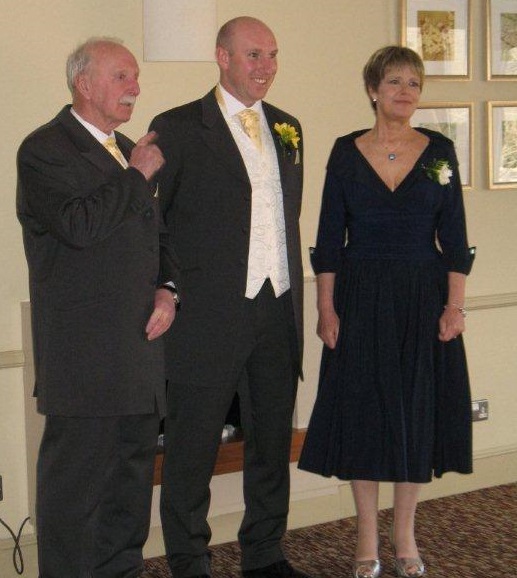
Nicky with her husband at her son's wedding
Tell me about when you went into hospital. What was that like?
I can remember the first night my husband took me into hospital; when I was, in my mind, there for good. I broke down as soon as he left.
A nurse came in, quite chipper, and said, ‘Oh, are you all right?’ and I snapped at her, ‘Of course I’m not all right.’ That wasn’t the best start to our relationship!
But that night was so hard for me. It just brought it home that there was no going back now.
And how about transplant day?
I still haven’t got over the thought of having someone’s else stem cells – on the day, I didn’t even want to see them. I told the nurse I was going to shut my eyes through the whole process. I’ve never given blood in my life, you see ,and if my boys cut themselves I’m the first one to go and lie down!
But there was a deeper feeling, beyond squeamishness; I was worried that I wasn’t me anymore.
There are times where I joke about it, saying I’ve got young blood in my veins now. But deep down, I don’t think I have quite come to terms with it – although I am eternally grateful for it, as it’s why I am here today.
How did you find the isolation period?
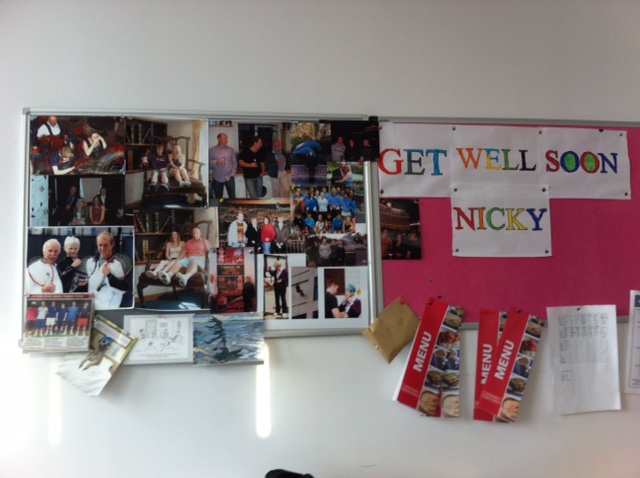
Some pictures and well wishes to help Nicky during isolation
It’s quite bizarre, really. During my stay I used something called CaringBridge.
It’s a ‘health journal’ website where you can post updates on how you’re feeling, and everyone will reply.
I wanted to use it as a way of stopping everyone from ringing my husband, or feeling guilty that they weren’t ringing, or being nervous about ringing in case I’d died. People sometimes worry that they’re uncaring if they don’t ring, and end up troubling the family unnecessarily if they do.
Obviously when you’re in isolation at the hospital, there isn’t a lot to write about – I remember one post I put up: my daughter in law had done my toenails for me with gel before I’d gone in, and I wrote about sitting there looking at my reflection in my toenails! That was the most exciting thing in my day.
Another update I wrote was about a crane outside my hospital window; I was determined to see the crane driver climb up it one day, but never did in the five weeks I was in.
Of course, it was also during the 2012 Olympics, so there was lots of chatter about that going on which kept me sane.
So you went in thinking you might not come out of hospital. What was it like to go home?
I almost felt I’d been allowed to go home from hospital too soon. I wasn’t emotionally ready.
I still have the text on my phone to my boys, asking them not to come at first: don’t text or call, just give me a day. You see, I hadn’t visualised coming out, so I had to get my head round going home.
Did you feel permanently changed because of the experience?
Yeah. It’s moved me into a different place. I’m a lot less tolerant of fussing or time-wasting. I think that’s to do with thinking, ‘You’re on a bit of a tight timeline.’
I do still feel that; I try to cram a lot in. To make the most of each day.
Did you have any psychological support during this process?
I did have some psychological support, but I probably needed more, honestly.
As I’d already decided to die, I didn’t quite know how to live any more. I’d done such a good job of putting my house in order and tidying my affairs, and now I couldn’t quite unravel it and start again.
What do you know about your donor? Have you ever made contact?
I did write to her once; something very bland, as you aren’t allowed to put in anything personal at first. And that’s it so far.
I have concerns. I feel a whole range of emotions when I think about her, really.
I feel guilty that I haven’t contacted her again; she must think I’m terribly ungrateful. And I don’t know whether I can take on the responsibility of meeting her, in case she doesn’t like me.
Lots of unknowns?
Exactly. I’m not the most open and friendly of people, in a gushing way – I wouldn’t want her to be disappointed that she hasn’t saved someone else.
After my transplant, I just went back to my little life. Have I done something worthy enough? I haven’t climbed Everest; there’s nothing I can show her as a demonstration of my happiness at, well…being here.
So I’ve thought it through, and I’ll continue to think it through.
A day doesn’t go by without me thinking about her, though – and I do try and cram in a lot.
You certainly do – like the Transplant Games and the World Transplant Games! Can you tell me more about how you got involved in that?
Like we all probably do! When you have something wrong with you, you Google it. And that’s what I was doing when I came across the British Transplant Games, Googling transplants.
I saw that it was something that bone marrow transplant recipients could take part in. And I thought, why not? I’m doing things now I wouldn’t have ever done before; I’m definitely a bit braver than I used to be.
Competing in the British Transplant Games for Anthony Nolan was fantastic – it was such fun and so wonderful to meet other BMT patients.
Then, of course, there were the World Transplant Games in Argentina this year. I wanted to do it for myself, and I really wanted to get involved as part of the team, so I went without my family.
To be a member of team GB, and have the opportunity to take part, is such a privilege. I couldn’t have been more proud.
And what an achievement! Gold medal at the World Transplant Games.
Yes, I suppose it is. I’ve achieved a fair bit since my transplant, really. I turned 60, I do volunteering work in tennis and was at my son’s wedding 9 months after my transplant. I also saw my other son get a full-time job and a lovely girlfriend, and last year I got to meet my first grandchild Ellie.

Nicky and her granddaughter Ellie
I wouldn’t have dreamt that I’d be alive to see these things, back in August 2012 before my transplant. And they’re the things I’ll share with my lovely donor, when the time is right to make contact beyond an anonymous thank-you letter.
I think these are the things I would love all donors to see: just how appreciative we are to be able to live a normal life, and see our children grow up and get married, and have children themselves. The opportunity to live a bolder life, venture outside our comfort zone, and – beyond doubt – live life to the full.
I’d also love to acknowledge the wonderful Bone Marrow Team at the Churchill Hospital, who were outstanding in their care and concern throughout the treatment and still support me 100% in my check ups.
